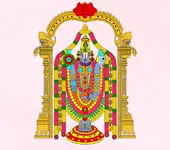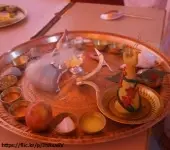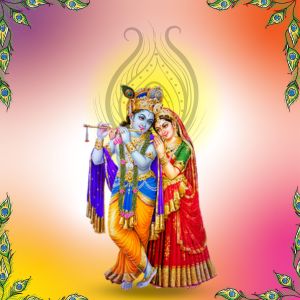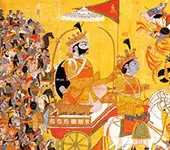This discourse describes how Sanjaya consoled Dhritarashtra when he was lamenting about the death of his sons.
Who was Sanajya's father in Mahabharata?
Gavalgana. He was a suta (charioter).
What happened to Sanjaya after Dhritarashtra died?
When the forest fire broke out, Dhritarashtra sent Sanjaya away. Dhritarashtra, Gandhari, and Kunti died in that fire. Later, Sage Narada saw Sanjaya with some Rishis on the banks of Ganga. From there, Sanjaya went towards the Himalayas to observe tapas.
Quiz
Sanjaya narrated the battle of Kurukshetra to Dhritarashtra. Was Sanjaya present on the battlefield?Transcript
(Click here to read more)
Dhritarashtra was telling Sanjaya that how he became sure about the defeat of his sons looking at the events that happened before and during the war. Dhritarashtra says that he can only see darkness ahead. In front of his eyes, there is already darkness, the physical darkness because of his blindness. Here when he says that there is darkness ahead, it means there is no clarity as to where all this is heading. The way ahead is dark. He is overpowered by moha. What is moha? कार्य�....
Transcript
(Click here)
Dhritarashtra was telling Sanjaya that how he became sure about the defeat of his sons looking at the events that happened before and during the war.
Dhritarashtra says that he can only see darkness ahead.
In front of his eyes, there is already darkness, the physical darkness because of his blindness.
Here when he says that there is darkness ahead, it means there is no clarity as to where all this is heading.
The way ahead is dark.
He is overpowered by moha.
What is moha?
कार्याकार्यरोरप्रतिपत्तिः मॊहः
Not able to make out what should be done and what should not be done.
This state is callee moha.
He became so worried that he fainted.
Dhritarashtra fainted.
So these are not just words.
He was feeling all these internally.
And he fainted.
When he woke up, he told Sanjaya: I don’t want to live anymore, I want to die.
I don’t find any use of living anymore.
Sanjaya tried to console Dhritarashtra.
I have heard about great kings of the past about whom Vyasa and Narada have described.
Born in great vamshas.
As powerful as Indra himself.
Of great qualities.
They have ruled conforming to dharma.
They have done great yajnas understanding the importance of yajnas for the welfare of everyone.
Not once, they kept on doing yajnas.
Narada has spoken about twenty-four such kings.
शैब्यं महारथं वीरं सृंजयं जयतां वरम्॥
सुहोत्रं रन्तिदेवं च काक्षीवन्तमथौशिजम्।
बाह्लीकं दमनं चैद्यं शर्यातिमजितं नलम्॥
विश्वामित्रममित्रघ्नमम्बरीषं महाबलम्।
मरुत्तं मनुमिक्ष्वाकुं गयं भरतमेव च॥
रामं दाशरथिं चैव शशबिन्दुं भगीरथम्।
कृतवीर्यं महाभागं तथैव जनमेजयम्॥
ययातिं शुभकर्माणं देवैर्यो याजितः स्वयम्।
चैत्ययूपाङ्किता भूमिर्यस्येयं सवनाकरा॥
इति राज्ञां चतुर्विंशन्नारदेन सुरर्षिणा।
पुत्रशोकाभितप्ताय पुरा श्वैत्याय कीर्तितम्॥
Out of these Yayati was such a dharmishta that anywhere you look on earth you could see yaga vedis during his time.
But they all passed away.
They were not here forever.
They are not here now.
In spite of being so great, they all died.
This was told by sage Narada to king Shvaitya who was sad and dejected at the loss of his sons.
Shvaitya was facing a similar situation as Dhritarashtra is facing today.
Narada said that all these twenty-four kings, they died.
Death is inevitable.
Doesn’t matter whether you are good or bad, big or small.
These are all kings of recent time.
In the earlier yugas also there were great kings such as Puru, Kuru, Yadu; a number of such names are being taken here.
There were hundreds of such kings in the past.
Many many poets have sung about their greatness, their qualities.
They have performed miracles, they were courageous, great tyagis, bhaktas, honest, pure, kind, simple.
Even they all died.
Like how your sons have died, Sanjaya is telling Dhritarashtra.
Your sons were evil, wicked, arrogant, harsh, rude, notorious for their misbehavior.
They don’t deserve your grief.
You should not cry about their death.
They have invited death for themselves.
They don’t deserve your tears.
You have heard the shastras from great gurus, you have learned from great gurus, able gurus.
Not only that, you have wisdom to understand them.
Those who think in accordance with shastra, those who look at the world as shastra portrays it...
This is a very important point here.
Take for example a place, Ladakh.
The tourist place.
The physical place is the same for everyone.
For a normal tourist going there, it is a scenic place, for enjoyment.
He goes there for enjoyment, for some time.
Does a shopkeeper in Ladakh feel the same?
He is full of his everyday problems.
It is his livelihood.
For a police officer posted there, he will be seeing all criminals around.
He will be looking out for trouble makers.
A soldier posted there will have a different perspective about Ladakh.
Same place, but different different perspectives.
Different different experiences.
What Sanjaya says is that: you have had the opportunity to learn shastras from able gurus.
If you have conditioned your mind according to what you have learned, then you should not be feeling like how you are feeling now.
Not only that, you know very well that you have been unfair towards Pandavas and showed partiality in favor of your own sons.
Anyway, whatever is to happen will happen.
Nobody is intelligent enough to stop what is going to happen.
Whatever path is laid out by Vidhatha the Almighty, nobody can waver from that path.
Recommended for you
Meaning of Sri Venkatesha Mangalashasanam
 Click here to know more..
Click here to know more..
Eight kinds of wealth and how long each one lasts
 Click here to know more..
Click here to know more..
Vanamali Vasudeva Bhajan

vanamaali vaasutheva manamohana raadhaa ramana. shashivathana sarasijanayana jaganmohana raadhaa ramana.....
Click here to know more..
English Topics
Mahabharatam
Click on any topic to open
- 96 Two Curses That Worked against Karna
- 95 What is behind Calling the Five Brothers the Pandavas
- 94 Give up an Individual IF....
- 93 Fascinating Birth Story of the Kauravas
- 92 Overcoming Grief - Lessons from King Senajit's story
- 91 Yayati's Wisdom
- 90 Yayati's Story
- 89 Brahmacharis Can Bless And Curse
- 88 Human Nature - Comples Mix Of Good And Bad
- 87 Results Of Good Karma
Please wait while the audio list loads..
30
Ganapathy
Shiva
Hanuman
Devi
Vishnu Sahasranama
Mahabharatam
Practical Wisdom
Yoga Vasishta
Vedas
Rituals
Rare Topics
Devi Mahatmyam
Glory of Venkatesha
Shani Mahatmya
Story of Sri Yantra
Rudram Explained
Atharva Sheersha
Sri Suktam
Kathopanishad
Ramayana
Mystique
Mantra Shastra
Bharat Matha
Bhagavatam
Astrology
Temples
Spiritual books
Purana Stories
Festivals
Sages and Saints
